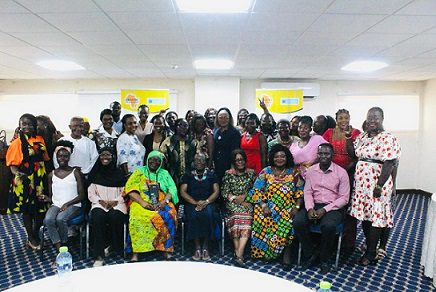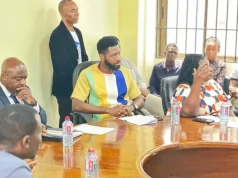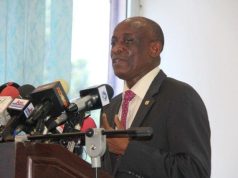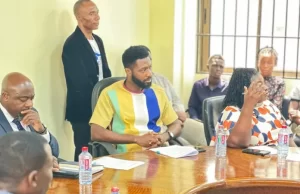ABANTU for Development, sponsored by STAR-Ghana Foundation and funded by the Foreign, Commonwealth, and Development Office, has launched a project dubbed: “Strengthening Capacities on Gender Equality and Socially Inclusive Ghana’s Elections 2024 and Beyond.”
This project seeks to increase women’s participation in Ghana’s political sphere, addressing long-standing barriers and promoting a more representative and equitable electoral process before the 2024 elections.
Tackling Structural Barriers to Women’s Political Participation
Madam Dorcas Coker-Appiah, Executive Director of the Gender Studies and Human Rights Documentation Centre, speaking at the launch highlighted deep-rooted social biases that prevent women from fully participating in politics.
“In many communities, leadership is seen as a role for men, often sidelining women’s voices and capabilities,” she stated. “We need to change these perceptions and recognize the valuable contributions women bring to leadership and decision-making roles.”
Coker-Appiah challenged the idea that a lack of education limits women’s political potential. “Many men in leadership roles have only basic education.
So why can’t women with similar qualifications hold office too?” she questioned, advocating for the inclusion of women’s perspectives in national development.
To achieve this, she stressed the importance of breaking down outdated societal norms that limit women to traditional domestic roles. “Women possess unique insights and wisdom that are critical for a balanced and inclusive approach to national growth,” she said.
Implementing Ghana’s New Affirmative Action Act
The recent passage of Ghana’s Affirmative Action (Gender Equity) Act is a landmark achievement in the fight for gender equality, mandating that at least 30% of decision-making positions be filled by women by 2030.
However, Coker-Appiah emphasized that this milestone must be accompanied by effective implementation strategies. “Laws alone aren’t enough—we need active strategies and awareness to ensure the public understands their rights and can hold leaders accountable,” she said.
According to the Act, political parties are also required to take concrete steps to support female candidates. This provision highlights the need for public education, as many citizens remain unaware of the law’s protections and opportunities.
“We need civil society to spread awareness, ensuring that citizens can demand compliance from political parties and other institutions,” Coker-Appiah asserted.
She called on political parties, government agencies, and communities to work together to turn this legal victory into practical, visible change.
Building Capacity for Inclusive Elections
Hamida Harrison, Resource Mobilization and Sustainability Manager at Abantu for Development shared her vision for a peaceful, fair, and inclusive 2024 election cycle.
“This project is about creating an electoral process that includes all voices, particularly those of women and marginalized groups,” Harrison explained.
She detailed the project’s focus areas, which include providing training for female candidates and educating the electorate on the importance of supporting women leaders.
Hamida Harrison emphasized the critical role of investing in women for national development. “Excluding women from decision-making roles stalls our progress.
Women’s perspectives are essential to the holistic growth of our communities,” she stated. She also called for intergenerational inclusion, encouraging young women to recognize the opportunities available to them and to actively participate in shaping Ghana’s future.
Urging Political Parties to Support Female Representation
Becky Ahadzi, Coordinator of the Affirmative Action Bill Coalition, speaking on behalf of the Convener of the Affirmative Action Bill coalition, Mrs. Sheila Minkah-Premo Esq stressed the importance of political parties in realizing the goals of the Affirmative Action Act.
“Women play a major role in campaigns and mobilization, yet their contributions are rarely mirrored in leadership roles,” she said.
She urged Ghanaians to support female parliamentary and presidential candidates across party lines in the 2024 elections, noting that only 14.5% of Ghana’s parliament is female, far below the 30% goal.
The Act requires political parties to allocate resources and support systems to elevate female candidates, yet many parties still fall short of these expectations.
“We need parties to take proactive steps to empower women in leadership positions, especially given their role in campaigning and mobilization,” she noted.
She also encouraged women within political parties to leverage their influence and demand that parties uphold the mandates of the new law.
Star Ghana Foundation: A Vision for an Inclusive Future
Speaking on behalf of Star Ghana Foundation, the organization’s Portfolio Manager emphasized the importance of gender equality and social inclusion as cornerstones of a democratic society.
“We have an opportunity to create a political environment where every voice counts and every individual can participate, regardless of gender or background,” he said.
He lauded the partnership between Abantu for Development and Star Ghana Foundation, recognizing it as a vital step towards empowering marginalized communities and ensuring more equitable elections in 2024 and beyond.
Acknowledging the contributions of partners and stakeholders, he underscored the collective effort required to drive meaningful change. “As we approach the 2024 elections, let’s build a political landscape that reflects the true diversity and resilience of Ghana,” he concluded.
A Call for a Gender-Inclusive Future
The launch of “Strengthening Capacities on Gender Equality and Socially Inclusive Ghana’s Elections 2024 and Beyond” represents a significant commitment to making Ghana’s political landscape more inclusive.
By educating communities, equipping female candidates, and holding political institutions accountable, Abantu for Development and Star Ghana Foundation are laying the groundwork for lasting change.
As Ghana heads toward its 2024 elections, this initiative calls on citizens to support and uplift women in leadership roles, ensuring a political environment that values every voice and embodies the nation’s diverse strengths.
With the Affirmative Action Act providing a legal foundation, Abantu for Development, with sponsorship from STAR-Ghana Foundation and support from the Foreign, Commonwealth, and Development Office, is leading the charge for a future where all Ghanaians have an equal stake in governance and national progress.
Source: Isaac Kofi Dzokpo/newsghana.com.gh
















